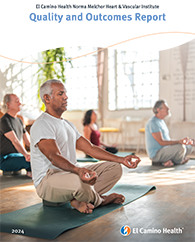Prepare to Go Home
Your heart care team will evaluate your health and determine when you’re ready to go home after open-heart surgery. Before you can go home, your team will ensure that:
- Your pain is controlled by oral pain medicine.
- Your heart rate, blood pressure and other vital signs are normal.
- You’re walking five or six times a day with little or no assistance.
- You can get in and out of bed without using side rails.
- You’re passing gas, you’ve had a bowel movement, and you don’t feel bloated.
You'll need a friend or family member to stay at home with you for approximately a week. In some instances, you may benefit from home healthcare services or a short stay in a skilled nursing facility. Our care coordination team can offer information and resources to help you plan for your needs once you leave the hospital.
In addition, we encourage all our patients to participate in our Cardiac Rehabilitation Program, an outpatient program that can help you regain strength and lower your heart disease risk factors.
Your Medication
Your care team will give you a list of medicines to take; they may be different from the medicines you took before surgery. Your nurse will give you instructions on how and when to take them:
- Have a friend or family member pick up your prescriptions as soon as you’re discharged.
- Some medicines may need to be gradually discontinued.
- Make sure you bring all your prescriptions with you to your follow-up appointment with your cardiologist.
Information for Valve Surgery Patients
If you've had a heart valve repaired or replaced, you need to take precautions to protect against bacterial endocarditis, an infection of the heart lining. It may be caused by dental work or surgery. Usually, it can be prevented by taking antibiotics before and after procedures.
To protect against infection, you should:
- Make sure all your medical and dental providers know you've had valve surgery so they can prescribe an appropriate antibiotic if you need surgery.
- Get a medical ID bracelet to ensure all care providers know you’ve had valve surgery.
